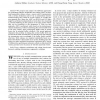Free Online Productivity Tools
i2Speak
i2Symbol
i2OCR
iTex2Img
iWeb2Print
iWeb2Shot
i2Type
iPdf2Split
iPdf2Merge
i2Bopomofo
i2Arabic
i2Style
i2Image
i2PDF
iLatex2Rtf
Sci2ools
97
Voted
TWC
2010
2010
Dual-hop adaptive packet transmission systems with regenerative relaying
We propose and analyze two different approaches for performing adaptive modulation and coding (AMC) in dualhop transmission systems, where a source node S communicates with a certain destination node D via an intermediate decodeand-forwarding relay station R. In this regard, we consider the most general case, where the AMC on the S-R and R-D links might be performed independently of each other, thus requiring a potential buffering of data packets at the relay station before they can be forwarded to the destination D. With our first approach, AMC is performed solely based on the instantaneous channel realizations, without considering the current buffer level at the relay station, what consequently might result in packet losses due to potential buffer overflows. Our second approach eliminates this problem by taking the current buffer level into account in the AMC transmission over the first hop and reducing the transmission rate accordingly if the buffer would overflow otherwise. Both sc...
Artificial Intelligence | Current Buffer Level | Decodeand-forwarding Relay Station | Relay Station | TWC 2010 |
Related Content
| Added | 22 May 2011 |
| Updated | 22 May 2011 |
| Type | Journal |
| Year | 2010 |
| Where | TWC |
| Authors | Andreas Müller 0001, Hong-Chuan Yang |
Comments (0)

